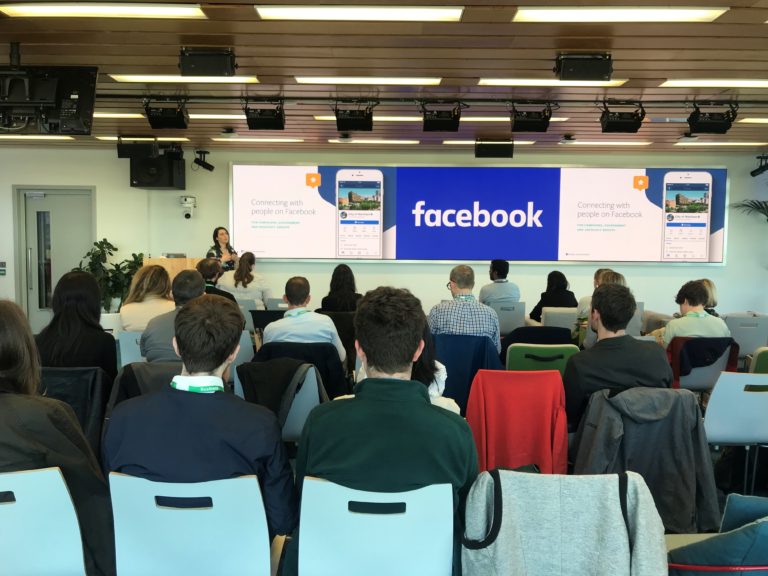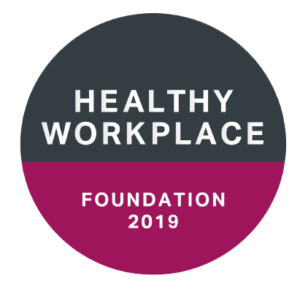Through our Digital Behaviour Change project, we’ve learned that Facebook Groups can have an important role in supporting people to become and stay active, particularly during lockdown.
Introduction
While Facebook Pages are something like a personal Profile for organisations, Groups are for like-minded people who share a common interest to communicate such as trying to improve fitness or physical health.
Groups have more of a forum feel with the same prominence given to posts by Group members as those made by admins and usually a healthy discussion thread in each post.
Posts from Facebook Groups also enjoy a higher priority in the News Feed meaning that reach is also more favourable. And as Groups feel like safe places for users, interaction levels are high in comparison to Pages.
Having a Facebook Page was once a sure-fire way to gain exposure for your organisation or club.
Simply having an account and posting updates to your followers was a simple way to get your message out without the need for costly advertising. Nowadays however the sheer number of Pages (an average user follows at least 70 pages) vying for attention is overwhelming.
This competition, combined with various algorithm updates that favour posts from friends and family, results in very few of a Page’s fans actually seeing its content. The average reach for a Page is currently just six per cent of fans.
Another change that Facebook Pages have faced in recent years is dramatically falling levels of engagement – people simply do not like, comment and share Page content to the degree they did previously.
Facebook Groups have a number of features, most of which are unavailable on Pages, which can enhance the member experience.
These include:
- Mentorship programme for peer support
- Social learning units which effectively enable you to host a curriculum of training resources in one familiar and easy-to-use platform for free
- For organisations involved in getting people active the ability to help people learn new things through video or written content in these social learning units and the function to track progress throughout is invaluable and offers a level of functionality normally associated with purpose-built, paid-for platforms
- Multiple features for video including the ability to upload pre-recorded video, create Facebook Live video for live broadcast which can also be archived and the new Messenger Rooms which provides a Zoom-like experience for Group members
- Post formatting in the form of page mark-up enabling you to prettify your posts with headings, bullets, bold, italics and more
- Topics which enable posts to be organised into categories
- Polls to help you carry out member research as well as aide engagement
- Data capture of new members via a question and answer tool (you can even collect email addresses)
- Options on Group visibility enabling Groups and their content to be public or private
- A helpful search function that helps members quickly find content
- Pinned posts and announcements for important information
Using Facebook Groups to support people to be active
The interactive behaviour from members makes Groups a great option for supporting people wanting to become more active. The more motivation, support and encouragement people get, the more likely they are to continue their fitness journey.
Groups can be used to build a community around a given topic, such as getting into running, and then enable easy connections with others. Members are encouraged to perform the activities whilst the Group creates inspiration and motivation as well as a support network.
Examples of support provided through Facebook Groups:
The ability of Groups to show other people “like me” enjoying activities through the posts they share are also inspiring
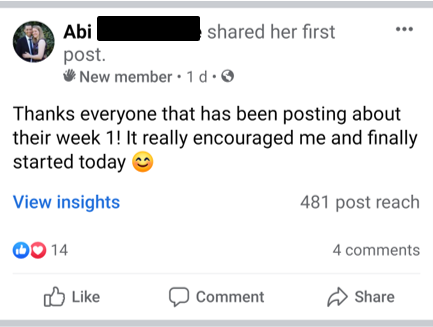
Peer support is also crucial in helping get people over set backs and frustrations
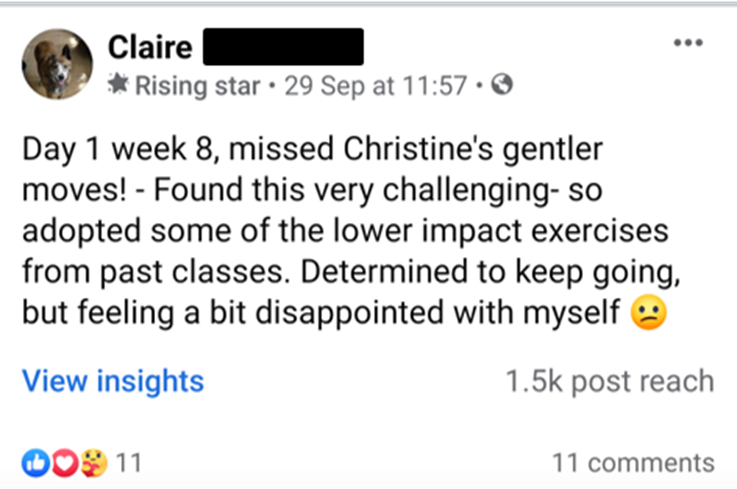
Groups also provide a place for members to share their successes
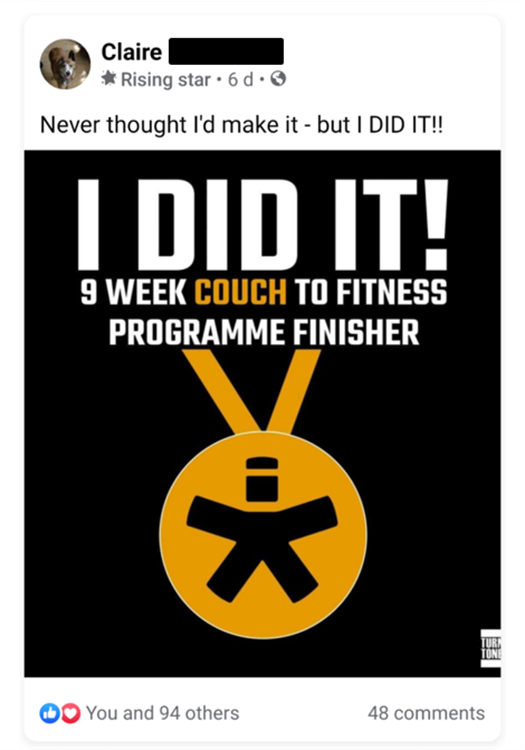
Group members will also respond to FAQs and even relatively obscure questions that might otherwise bog organisers down
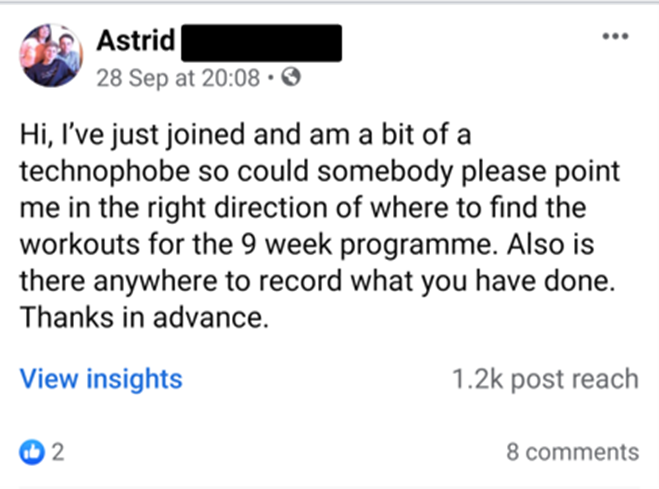
Facebook Spotlights
For the reasons outlined above, a community-feel in addition to reach and engagement for the organiser, Facebook Groups can be a fantastic resource to help support people to be more active.
Here’s four Facebook Groups which are excellent case studies on how to do it well:
Couch to 5K is an app developed by Public Health England and BBC Get Inspired that guides people through a running plan and is designed for absolute beginners.
The Couch to 5K UK Facebook Group was created in 2019 by amateur runner Sian Gomersall and two friends who decided to create a dedicated Group for participants to post about their running journeys and support each other.
It aims to help support people through the Couch to 5K programme as well as being a place they can continue their running journeys after they graduate.
The Couch to 5K admins find there’s no need to create content as members post regularly and there is plenty of peer support for whatever is posted. The main Admin role is moderation – checking that members are not spammed with promotional content.
Sian said:
“The main success of the group is how many people it has helped and helps on a daily basis. If you ask any of our members they’d say that they find it one of the most supportive groups on Facebook. There is no drama, no gossip. Just lots of support!”
Member Karen Wiv (49) said:
“The support and encouragement I have received from complete strangers is phenomenal. People help people, we encourage and we learn from others. It’s a great space, and it’s a pleasure to login to the group every day. So inspiring and motivational.”
Couch to Fitness is a nine-week National Lottery funded home exercise plan for beginners, developed by Our Parks with backing from Sport England, to help people who need extra support and motivation to increase their physical activity levels.
London Sport worked with Our Parks to set up a Facebook Group to make it easier for people starting the programme to connect with other users.
It enables Our Parks to create exclusive content for members including live workouts, Q+A sessions with the instructors and exercise variation videos to give people alternative options for the more difficult moves.
The group has over 5,000 members who have been sharing their experiences and supporting each other on their journey to being more active.
Our Parks founder Born Barikor said:
“The Facebook group has become an integral part in helping communities come together and share their successes from the programme. It has become a place where Parkers can offer support to each other and week on week, we can see this community of Parkers growing as more people take part.”
Exercise training providers Later Life Training took the opportunity during the covid-19 lockdown to create a Facebook Group providing thrice daily live videos encouraging their users to move more frequently.
The aim was to motivate older people to move more, move better and move more often to benefit their muscles, mind and wellbeing.
The Group now boasts over 3,000 members taking part in the 20 minute “Movement Snacks” delivered by Make Movement Your Mission trainers.
As well as live videos the team posts inspirational quotes and images as well as helpful links. The use of open ended questions as well as the Polls tool results in particularly engaging content and have also provided feedback on member thinking and behaviour.
Later Life Training Director Bex Townley said:
“People like the personalised, informal, positive and genuine approach and we try to offer something for everyone – this is about movement and not structured exercises. They recognise we are knowledgeable and we are genuine in our aim, we love doing it and people see that.”
Member Frances Macfarlane (68) said:
“During lockdown it really cheered me up having the friendly routine of the activities three times daily. I now notice an improvement to my posture during everyday activities. Also my agility & balance has improved.”
Let’s Move is a new programme led by Versus Arthritis for people with arthritis who want more movement in their lives.
The accompanying Facebook Group, Let’s Move Versus Arthritis provides members with all the latest digital content including expert tips and advice, myth-busting information as well as a range of movement sessions.
The group, which launched in November 2020, has over 2,400 members. There is high engagement from members who are encouraged to share their stories, personal aims and experiences with others.
Poppy Macleod, Physical Activity Digital Producer at Versus Arthritis said:
“It’s been brilliant to be able to offer this group as it provides a unique source of peer support for members. This in turn can be a great motivating factor and we’ve seen it help members to feel confident in taking the step to incorporate movement into daily life.”
More information and contact details:

Chris Norfield is our Head of Digital Behaviour Change.
He has led on the organisation’s work on targeted digital marketing and behaviour change for physical activity and sport.
Chris’ combined digital and behavioural science expertise have guided London Sport’s approach to marketing physical activity to less active Londoners.
Contact Chris: [email protected]

